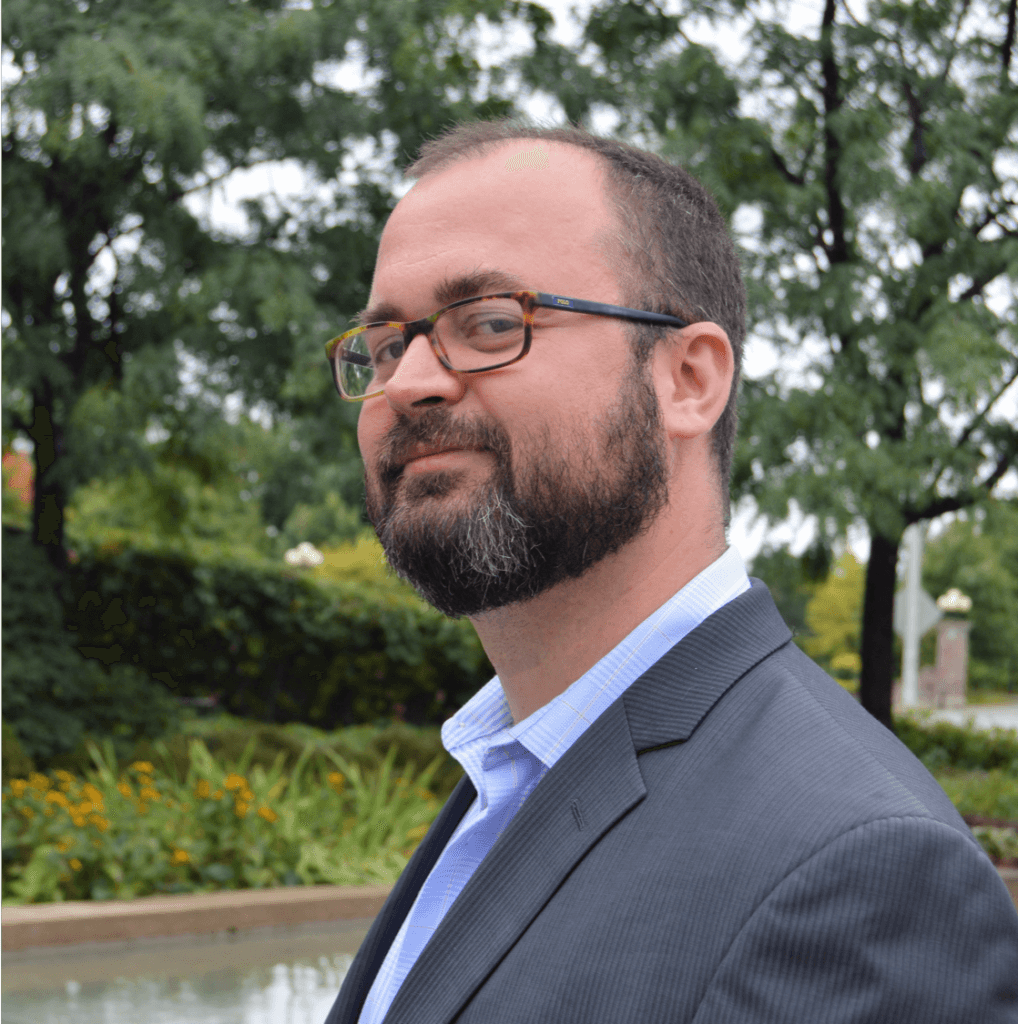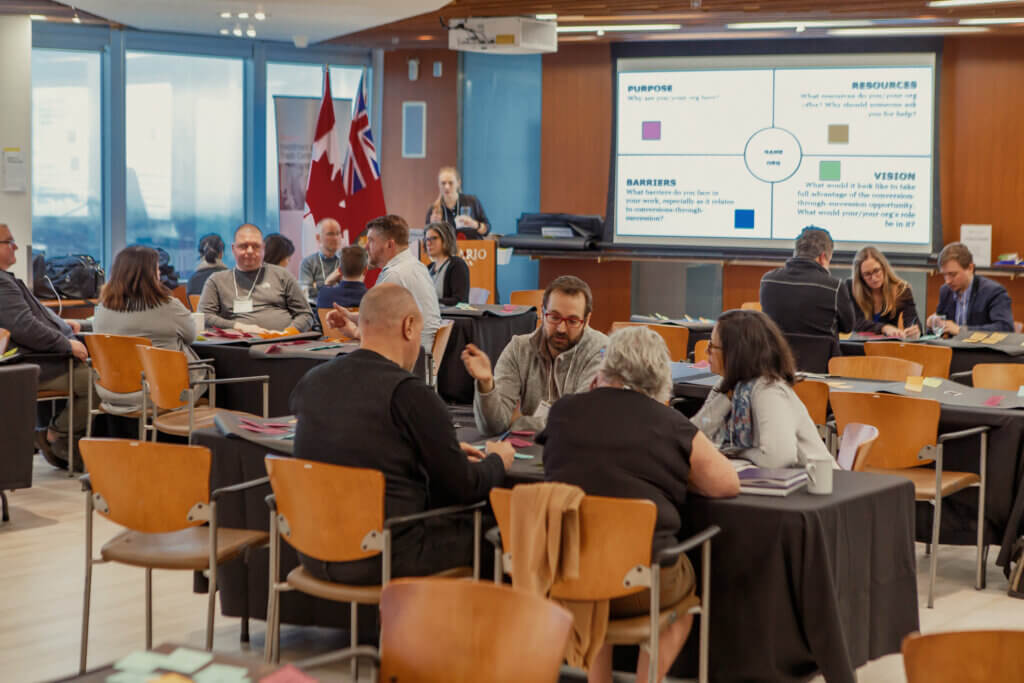Strengthening Waterloo’s Innovation Corridor
MEDI students craft bold visions for a vibrant David Johnston Research + Technology Park This story was originally published on…
When environmental leaders talk about sustainability, they often focus on how to transform practices or create new technologies to reduce or eliminate adverse impacts on the environment. These sustainable measures include everything from protecting marine life in commercial fishing operations to keeping people and cargo moving through their airways.
Working towards sustainable practices takes commitment and something else we don’t often acknowledge—resilience. The University of Waterloo’s Waterloo Institute for Social Innovation and Resilience (WISIR) is a David Johnston Research and Technology Park tenant on a mission to help organizations understand how critical resilience is to their sustainability efforts.

Sean Geobey, an assistant professor and the co-director of WISIR at the University, said that the institute defines resilience as the capacity of an organization, a system, or a person to maintain a coherent sense of what and who they are while in the midst of crises so they can survive. But Geobey said that resiliency isn’t always a good thing.
“There are very resilient situations that are, in fact, incredibly detrimental. The fossil fuel industry is incredibly resilient right now—and also massively ecologically destructive. The systems of government and capitalism we have really do make destructive companies and industries incredibly resilient,” Geobey said. Geobey and the WISIR team’s research examines how to create a sustainable world through innovation. They define sustainability as having the ability to use resources today while ensuring future generations can also live in a safe environment.
Geobey and the WISIR team’s research examines how to create a sustainable world through innovation. They define sustainability as having the ability to use resources today while ensuring future generations can also live in a safe environment.
To create a truly sustainable planet, humanity needs to be resilient for the long term. Becoming more resilient takes more than creating new processes and technologies. It also means looking at things that seem resilient but have negative outcomes. Geobey said that we’re quick to develop new ideas and advanced technologies to improve sustainability, but that eliminating ideas and technologies that prolong the life of unsustainable practices needs to happen too.
“We can celebrate a lot of births—but we also have to have funerals as well. We need to be able to transition out things that aren’t working in ways that keep around what was good,” Geobey said.
WISIR’s research looks at more than environmental resilience. Their most recent project was the Legacy Leadership Lab, which looked at a looming economic issue affecting small businesses and the cities where they’re based called the “silver tsunami.” Over the next decade, thousands of baby boomers are expected to retire. Many are small business owners who want to transition or sell their businesses without a market looking to take over.

“Many have never talked to their children to see whether they want to take over the business. Then there are not enough people looking to buy those businesses, which kills the retirement savings of the owners,” Geobey said.
Without viable options, those small businesses could cease to exist. The impact of this is massive. In Canada, small businesses employ 10.3 million people—nearly two-thirds of the labour force.
The Legacy Leadership Lab was a national project that brought together small business owners, government leaders, nonprofits, cooperatives, and financial institutions to look at options to help find ways to transition these businesses and support local economies. One potential answer was developing ways to make it easier for communities to purchase businesses that are vital to the local community.
“If the business is the last grocery store in a small town, it could potentially take the whole town with it if it went out of business. Could the customers of that grocery store buy it out? Or if it’s a very specialized manufacturing firm that’s a critical part of the supply chain, could the workers buy that out? There are businesses who have a positive impact beyond just the profits they make for owners,” Geobey said.
One potential avenue for helping keep these businesses alive is the cooperative model. Geobey said leaders in that space have been looking at ways to extend the cooperative model beyond farming, grocery, and housing to new businesses. One of the gaps in making this happen has been a lack of capital to purchase businesses. Geobey said that the Government of Canada, through the Canadian Social Finance Fund, has committed $755 million towards a fund for social enterprises. He added that with private sector contributions, there’s a potential $3 billion investment to support social enterprises like cooperatives over the next decade.
“For a lot of folks in the cooperative sector looking at some of these potential businesses that could become coops, the barrier has been a lack of funding or easy finance. When we were talking to the federal government, we showed how there are hundreds of thousands of businesses that are going through this demographic transition over the next couple of decades. This is a time of transition where some of them might be well placed to become investable, social purpose organizations,” Geobey said.
WISIR is located in the evolv1 building in the R+T Park, also the home base for the University’s Master of Economic Development and Innovation (MEDI) graduate degree program. Geobey said that many MEDI graduates have gone into economic development roles across Canada, and their research at WISIR directly feeds into their work supporting local economies.
As a living lab in the R+T Park, Geobey said that being in evolv1 has opened some interesting new ways of researching sustainability and resilience. Geobey and Wilfrid Laurier University professor Manuel Reimer use evolv1 to look at how a building can make people work more sustainably.
“evolv1 itself is really an experiment. We’re looking at how organizations can embed sustainability into their practices. Hopefully future developments in the R+T Park can be more sustainable, not just in engineering and operation, but also creating social spaces that encourage people to engage in sustainable activities like taking transit or biking to work, reducing their garbage usage while they’re at work—and then bringing good practices back home.”